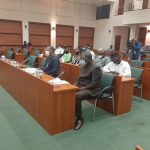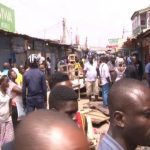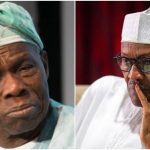Nigerian government said it is deeply concerned by the incessant harassment of its citizens in Ghana and the progressive acts of hostility towards the country by Ghanaian authorities, and will no longer tolerate such.
In a statement by the Minister of Information and Culture, Lai Mohammed, the Federal Government is urgently considering a number of options aimed at ameliorating the situation.
The Federal Government has been documenting the acts of hostility towards Nigeria and Nigerians by the Ghanaian authorities.
These include: – Seizure of the Nigerian Mission’s property located at No. 10, Barnes Road, Accra, which the Nigerian Government has used as diplomatic premises for almost 50 years. This action is a serious breach of the
Vienna Convention.
– Demolition of the Nigerian Mission’s property located at No. 19/21 Julius Nyerere Street, East Ridge, Accra, another serious breach of the Vienna Convention.
– Aggressive and incessant deportation of Nigerians from Ghana, between Jan. 2018 and Feb. 2019, 825 Nigerians were deported fromGhana.
– Closure of shops belonging to Nigerians. Over 300 Nigerians shops were locked for four months in Kumasi in 2018; over 600 Nigerian shops were locked in 2019 and, currently, over 250 Nigerians shops have been
locked.
– Residency Permit requirements, for which the Ghana Immigration Service has placed huge fees, far higher than the fees charged by the Nigerian Immigration Service. These include the compulsory non-citizen ID card (US$120, and US$60 for yearly renewal); Medical examinations, including for Covid-19 which is newly-introduced (about
US$120), and payment for residency permit (US$400 compared to the N7,000 being paid by Ghanaians for residency card in Nigeria)
– Outrageous stipulations in the Ghana Investment Promotion Centre Act. when the Act was initially promulgated in 1994, a foreigner is required to invest at least US$300,000 by way of equity capital and also employ 10 Ghanaians. This Act has now been amended twice, with the 2018 GIPC Act raising the minimum capital base for foreign-owned businesses to US$1m. Though targeted at foreigners, it seems GIPC’s definition of foreigners is Nigerians. The GIPC Act also negates the ECOWAS Protocol.
– Media war against Nigerians in Ghana. The negative reportage of issues concerning Nigerians resident in Ghana by the Ghanaian media is fuelling an emerging xenophobic attitude towards Nigerian traders and Nigerians in general. The immediate fallout is the incessant harassment and arrest of Nigerian traders and closure of their shops.
– Harsh and openly-biased judicial trial and pronouncement of indiscriminately-long jail terms for convicted Nigerians. There are currently over 200 Nigerians in the Nsawam Maximum prison in Ghana alone.
The Federal Government however appealed to Nigerians resident in Ghana to remain law abiding and avoid engaging in self help, despite their ordeal.
Nigerian government said it is deeply concerned by the incessant harassment of its citizens in Ghana and the progressive acts of hostility towards the country by Ghanaian authorities, and will no longer tolerate such.
In a statement by the Minister of Information and Culture, Lai Mohammed, the Federal Government is urgently considering a number of options aimed at ameliorating the situation.
The Federal Government has been documenting the acts of hostility towards Nigeria and Nigerians by the Ghanaian authorities.
These include: – Seizure of the Nigerian Mission’s property located at No. 10, Barnes Road, Accra, which the Nigerian Government has used as diplomatic premises for almost 50 years. This action is a serious breach of the
Vienna Convention.
– Demolition of the Nigerian Mission’s property located at No. 19/21 Julius Nyerere Street, East Ridge, Accra, another serious breach of the Vienna Convention.
– Aggressive and incessant deportation of Nigerians from Ghana, between Jan. 2018 and Feb. 2019, 825 Nigerians were deported fromGhana.
– Closure of shops belonging to Nigerians. Over 300 Nigerians shops were locked for four months in Kumasi in 2018; over 600 Nigerian shops were locked in 2019 and, currently, over 250 Nigerians shops have been
locked.
– Residency Permit requirements, for which the Ghana Immigration Service has placed huge fees, far higher than the fees charged by the Nigerian Immigration Service. These include the compulsory non-citizen ID card (US$120, and US$60 for yearly renewal); Medical examinations, including for Covid-19 which is newly-introduced (about
US$120), and payment for residency permit (US$400 compared to the N7,000 being paid by Ghanaians for residency card in Nigeria)
– Outrageous stipulations in the Ghana Investment Promotion Centre Act. when the Act was initially promulgated in 1994, a foreigner is required to invest at least US$300,000 by way of equity capital and also employ 10 Ghanaians. This Act has now been amended twice, with the 2018 GIPC Act raising the minimum capital base for foreign-owned businesses to US$1m. Though targeted at foreigners, it seems GIPC’s definition of foreigners is Nigerians. The GIPC Act also negates the ECOWAS Protocol.
– Media war against Nigerians in Ghana. The negative reportage of issues concerning Nigerians resident in Ghana by the Ghanaian media is fuelling an emerging xenophobic attitude towards Nigerian traders and Nigerians in general. The immediate fallout is the incessant harassment and arrest of Nigerian traders and closure of their shops.
– Harsh and openly-biased judicial trial and pronouncement of indiscriminately-long jail terms for convicted Nigerians. There are currently over 200 Nigerians in the Nsawam Maximum prison in Ghana alone.
The Federal Government however appealed to Nigerians resident in Ghana to remain law abiding and avoid engaging in self help, despite their ordeal.
Nigerian government said it is deeply concerned by the incessant harassment of its citizens in Ghana and the progressive acts of hostility towards the country by Ghanaian authorities, and will no longer tolerate such.
In a statement by the Minister of Information and Culture, Lai Mohammed, the Federal Government is urgently considering a number of options aimed at ameliorating the situation.
The Federal Government has been documenting the acts of hostility towards Nigeria and Nigerians by the Ghanaian authorities.
These include: – Seizure of the Nigerian Mission’s property located at No. 10, Barnes Road, Accra, which the Nigerian Government has used as diplomatic premises for almost 50 years. This action is a serious breach of the
Vienna Convention.
– Demolition of the Nigerian Mission’s property located at No. 19/21 Julius Nyerere Street, East Ridge, Accra, another serious breach of the Vienna Convention.
– Aggressive and incessant deportation of Nigerians from Ghana, between Jan. 2018 and Feb. 2019, 825 Nigerians were deported fromGhana.
– Closure of shops belonging to Nigerians. Over 300 Nigerians shops were locked for four months in Kumasi in 2018; over 600 Nigerian shops were locked in 2019 and, currently, over 250 Nigerians shops have been
locked.
– Residency Permit requirements, for which the Ghana Immigration Service has placed huge fees, far higher than the fees charged by the Nigerian Immigration Service. These include the compulsory non-citizen ID card (US$120, and US$60 for yearly renewal); Medical examinations, including for Covid-19 which is newly-introduced (about
US$120), and payment for residency permit (US$400 compared to the N7,000 being paid by Ghanaians for residency card in Nigeria)
– Outrageous stipulations in the Ghana Investment Promotion Centre Act. when the Act was initially promulgated in 1994, a foreigner is required to invest at least US$300,000 by way of equity capital and also employ 10 Ghanaians. This Act has now been amended twice, with the 2018 GIPC Act raising the minimum capital base for foreign-owned businesses to US$1m. Though targeted at foreigners, it seems GIPC’s definition of foreigners is Nigerians. The GIPC Act also negates the ECOWAS Protocol.
– Media war against Nigerians in Ghana. The negative reportage of issues concerning Nigerians resident in Ghana by the Ghanaian media is fuelling an emerging xenophobic attitude towards Nigerian traders and Nigerians in general. The immediate fallout is the incessant harassment and arrest of Nigerian traders and closure of their shops.
– Harsh and openly-biased judicial trial and pronouncement of indiscriminately-long jail terms for convicted Nigerians. There are currently over 200 Nigerians in the Nsawam Maximum prison in Ghana alone.
The Federal Government however appealed to Nigerians resident in Ghana to remain law abiding and avoid engaging in self help, despite their ordeal.
Nigerian government said it is deeply concerned by the incessant harassment of its citizens in Ghana and the progressive acts of hostility towards the country by Ghanaian authorities, and will no longer tolerate such.
In a statement by the Minister of Information and Culture, Lai Mohammed, the Federal Government is urgently considering a number of options aimed at ameliorating the situation.
The Federal Government has been documenting the acts of hostility towards Nigeria and Nigerians by the Ghanaian authorities.
These include: – Seizure of the Nigerian Mission’s property located at No. 10, Barnes Road, Accra, which the Nigerian Government has used as diplomatic premises for almost 50 years. This action is a serious breach of the
Vienna Convention.
– Demolition of the Nigerian Mission’s property located at No. 19/21 Julius Nyerere Street, East Ridge, Accra, another serious breach of the Vienna Convention.
– Aggressive and incessant deportation of Nigerians from Ghana, between Jan. 2018 and Feb. 2019, 825 Nigerians were deported fromGhana.
– Closure of shops belonging to Nigerians. Over 300 Nigerians shops were locked for four months in Kumasi in 2018; over 600 Nigerian shops were locked in 2019 and, currently, over 250 Nigerians shops have been
locked.
– Residency Permit requirements, for which the Ghana Immigration Service has placed huge fees, far higher than the fees charged by the Nigerian Immigration Service. These include the compulsory non-citizen ID card (US$120, and US$60 for yearly renewal); Medical examinations, including for Covid-19 which is newly-introduced (about
US$120), and payment for residency permit (US$400 compared to the N7,000 being paid by Ghanaians for residency card in Nigeria)
– Outrageous stipulations in the Ghana Investment Promotion Centre Act. when the Act was initially promulgated in 1994, a foreigner is required to invest at least US$300,000 by way of equity capital and also employ 10 Ghanaians. This Act has now been amended twice, with the 2018 GIPC Act raising the minimum capital base for foreign-owned businesses to US$1m. Though targeted at foreigners, it seems GIPC’s definition of foreigners is Nigerians. The GIPC Act also negates the ECOWAS Protocol.
– Media war against Nigerians in Ghana. The negative reportage of issues concerning Nigerians resident in Ghana by the Ghanaian media is fuelling an emerging xenophobic attitude towards Nigerian traders and Nigerians in general. The immediate fallout is the incessant harassment and arrest of Nigerian traders and closure of their shops.
– Harsh and openly-biased judicial trial and pronouncement of indiscriminately-long jail terms for convicted Nigerians. There are currently over 200 Nigerians in the Nsawam Maximum prison in Ghana alone.
The Federal Government however appealed to Nigerians resident in Ghana to remain law abiding and avoid engaging in self help, despite their ordeal.
Nigerian government said it is deeply concerned by the incessant harassment of its citizens in Ghana and the progressive acts of hostility towards the country by Ghanaian authorities, and will no longer tolerate such.
In a statement by the Minister of Information and Culture, Lai Mohammed, the Federal Government is urgently considering a number of options aimed at ameliorating the situation.
The Federal Government has been documenting the acts of hostility towards Nigeria and Nigerians by the Ghanaian authorities.
These include: – Seizure of the Nigerian Mission’s property located at No. 10, Barnes Road, Accra, which the Nigerian Government has used as diplomatic premises for almost 50 years. This action is a serious breach of the
Vienna Convention.
– Demolition of the Nigerian Mission’s property located at No. 19/21 Julius Nyerere Street, East Ridge, Accra, another serious breach of the Vienna Convention.
– Aggressive and incessant deportation of Nigerians from Ghana, between Jan. 2018 and Feb. 2019, 825 Nigerians were deported fromGhana.
– Closure of shops belonging to Nigerians. Over 300 Nigerians shops were locked for four months in Kumasi in 2018; over 600 Nigerian shops were locked in 2019 and, currently, over 250 Nigerians shops have been
locked.
– Residency Permit requirements, for which the Ghana Immigration Service has placed huge fees, far higher than the fees charged by the Nigerian Immigration Service. These include the compulsory non-citizen ID card (US$120, and US$60 for yearly renewal); Medical examinations, including for Covid-19 which is newly-introduced (about
US$120), and payment for residency permit (US$400 compared to the N7,000 being paid by Ghanaians for residency card in Nigeria)
– Outrageous stipulations in the Ghana Investment Promotion Centre Act. when the Act was initially promulgated in 1994, a foreigner is required to invest at least US$300,000 by way of equity capital and also employ 10 Ghanaians. This Act has now been amended twice, with the 2018 GIPC Act raising the minimum capital base for foreign-owned businesses to US$1m. Though targeted at foreigners, it seems GIPC’s definition of foreigners is Nigerians. The GIPC Act also negates the ECOWAS Protocol.
– Media war against Nigerians in Ghana. The negative reportage of issues concerning Nigerians resident in Ghana by the Ghanaian media is fuelling an emerging xenophobic attitude towards Nigerian traders and Nigerians in general. The immediate fallout is the incessant harassment and arrest of Nigerian traders and closure of their shops.
– Harsh and openly-biased judicial trial and pronouncement of indiscriminately-long jail terms for convicted Nigerians. There are currently over 200 Nigerians in the Nsawam Maximum prison in Ghana alone.
The Federal Government however appealed to Nigerians resident in Ghana to remain law abiding and avoid engaging in self help, despite their ordeal.
Nigerian government said it is deeply concerned by the incessant harassment of its citizens in Ghana and the progressive acts of hostility towards the country by Ghanaian authorities, and will no longer tolerate such.
In a statement by the Minister of Information and Culture, Lai Mohammed, the Federal Government is urgently considering a number of options aimed at ameliorating the situation.
The Federal Government has been documenting the acts of hostility towards Nigeria and Nigerians by the Ghanaian authorities.
These include: – Seizure of the Nigerian Mission’s property located at No. 10, Barnes Road, Accra, which the Nigerian Government has used as diplomatic premises for almost 50 years. This action is a serious breach of the
Vienna Convention.
– Demolition of the Nigerian Mission’s property located at No. 19/21 Julius Nyerere Street, East Ridge, Accra, another serious breach of the Vienna Convention.
– Aggressive and incessant deportation of Nigerians from Ghana, between Jan. 2018 and Feb. 2019, 825 Nigerians were deported fromGhana.
– Closure of shops belonging to Nigerians. Over 300 Nigerians shops were locked for four months in Kumasi in 2018; over 600 Nigerian shops were locked in 2019 and, currently, over 250 Nigerians shops have been
locked.
– Residency Permit requirements, for which the Ghana Immigration Service has placed huge fees, far higher than the fees charged by the Nigerian Immigration Service. These include the compulsory non-citizen ID card (US$120, and US$60 for yearly renewal); Medical examinations, including for Covid-19 which is newly-introduced (about
US$120), and payment for residency permit (US$400 compared to the N7,000 being paid by Ghanaians for residency card in Nigeria)
– Outrageous stipulations in the Ghana Investment Promotion Centre Act. when the Act was initially promulgated in 1994, a foreigner is required to invest at least US$300,000 by way of equity capital and also employ 10 Ghanaians. This Act has now been amended twice, with the 2018 GIPC Act raising the minimum capital base for foreign-owned businesses to US$1m. Though targeted at foreigners, it seems GIPC’s definition of foreigners is Nigerians. The GIPC Act also negates the ECOWAS Protocol.
– Media war against Nigerians in Ghana. The negative reportage of issues concerning Nigerians resident in Ghana by the Ghanaian media is fuelling an emerging xenophobic attitude towards Nigerian traders and Nigerians in general. The immediate fallout is the incessant harassment and arrest of Nigerian traders and closure of their shops.
– Harsh and openly-biased judicial trial and pronouncement of indiscriminately-long jail terms for convicted Nigerians. There are currently over 200 Nigerians in the Nsawam Maximum prison in Ghana alone.
The Federal Government however appealed to Nigerians resident in Ghana to remain law abiding and avoid engaging in self help, despite their ordeal.
Nigerian government said it is deeply concerned by the incessant harassment of its citizens in Ghana and the progressive acts of hostility towards the country by Ghanaian authorities, and will no longer tolerate such.
In a statement by the Minister of Information and Culture, Lai Mohammed, the Federal Government is urgently considering a number of options aimed at ameliorating the situation.
The Federal Government has been documenting the acts of hostility towards Nigeria and Nigerians by the Ghanaian authorities.
These include: – Seizure of the Nigerian Mission’s property located at No. 10, Barnes Road, Accra, which the Nigerian Government has used as diplomatic premises for almost 50 years. This action is a serious breach of the
Vienna Convention.
– Demolition of the Nigerian Mission’s property located at No. 19/21 Julius Nyerere Street, East Ridge, Accra, another serious breach of the Vienna Convention.
– Aggressive and incessant deportation of Nigerians from Ghana, between Jan. 2018 and Feb. 2019, 825 Nigerians were deported fromGhana.
– Closure of shops belonging to Nigerians. Over 300 Nigerians shops were locked for four months in Kumasi in 2018; over 600 Nigerian shops were locked in 2019 and, currently, over 250 Nigerians shops have been
locked.
– Residency Permit requirements, for which the Ghana Immigration Service has placed huge fees, far higher than the fees charged by the Nigerian Immigration Service. These include the compulsory non-citizen ID card (US$120, and US$60 for yearly renewal); Medical examinations, including for Covid-19 which is newly-introduced (about
US$120), and payment for residency permit (US$400 compared to the N7,000 being paid by Ghanaians for residency card in Nigeria)
– Outrageous stipulations in the Ghana Investment Promotion Centre Act. when the Act was initially promulgated in 1994, a foreigner is required to invest at least US$300,000 by way of equity capital and also employ 10 Ghanaians. This Act has now been amended twice, with the 2018 GIPC Act raising the minimum capital base for foreign-owned businesses to US$1m. Though targeted at foreigners, it seems GIPC’s definition of foreigners is Nigerians. The GIPC Act also negates the ECOWAS Protocol.
– Media war against Nigerians in Ghana. The negative reportage of issues concerning Nigerians resident in Ghana by the Ghanaian media is fuelling an emerging xenophobic attitude towards Nigerian traders and Nigerians in general. The immediate fallout is the incessant harassment and arrest of Nigerian traders and closure of their shops.
– Harsh and openly-biased judicial trial and pronouncement of indiscriminately-long jail terms for convicted Nigerians. There are currently over 200 Nigerians in the Nsawam Maximum prison in Ghana alone.
The Federal Government however appealed to Nigerians resident in Ghana to remain law abiding and avoid engaging in self help, despite their ordeal.
Nigerian government said it is deeply concerned by the incessant harassment of its citizens in Ghana and the progressive acts of hostility towards the country by Ghanaian authorities, and will no longer tolerate such.
In a statement by the Minister of Information and Culture, Lai Mohammed, the Federal Government is urgently considering a number of options aimed at ameliorating the situation.
The Federal Government has been documenting the acts of hostility towards Nigeria and Nigerians by the Ghanaian authorities.
These include: – Seizure of the Nigerian Mission’s property located at No. 10, Barnes Road, Accra, which the Nigerian Government has used as diplomatic premises for almost 50 years. This action is a serious breach of the
Vienna Convention.
– Demolition of the Nigerian Mission’s property located at No. 19/21 Julius Nyerere Street, East Ridge, Accra, another serious breach of the Vienna Convention.
– Aggressive and incessant deportation of Nigerians from Ghana, between Jan. 2018 and Feb. 2019, 825 Nigerians were deported fromGhana.
– Closure of shops belonging to Nigerians. Over 300 Nigerians shops were locked for four months in Kumasi in 2018; over 600 Nigerian shops were locked in 2019 and, currently, over 250 Nigerians shops have been
locked.
– Residency Permit requirements, for which the Ghana Immigration Service has placed huge fees, far higher than the fees charged by the Nigerian Immigration Service. These include the compulsory non-citizen ID card (US$120, and US$60 for yearly renewal); Medical examinations, including for Covid-19 which is newly-introduced (about
US$120), and payment for residency permit (US$400 compared to the N7,000 being paid by Ghanaians for residency card in Nigeria)
– Outrageous stipulations in the Ghana Investment Promotion Centre Act. when the Act was initially promulgated in 1994, a foreigner is required to invest at least US$300,000 by way of equity capital and also employ 10 Ghanaians. This Act has now been amended twice, with the 2018 GIPC Act raising the minimum capital base for foreign-owned businesses to US$1m. Though targeted at foreigners, it seems GIPC’s definition of foreigners is Nigerians. The GIPC Act also negates the ECOWAS Protocol.
– Media war against Nigerians in Ghana. The negative reportage of issues concerning Nigerians resident in Ghana by the Ghanaian media is fuelling an emerging xenophobic attitude towards Nigerian traders and Nigerians in general. The immediate fallout is the incessant harassment and arrest of Nigerian traders and closure of their shops.
– Harsh and openly-biased judicial trial and pronouncement of indiscriminately-long jail terms for convicted Nigerians. There are currently over 200 Nigerians in the Nsawam Maximum prison in Ghana alone.
The Federal Government however appealed to Nigerians resident in Ghana to remain law abiding and avoid engaging in self help, despite their ordeal.














